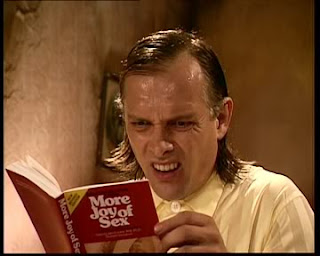 Unlike many, many people, I haven’t yet watched the Doctor Who episodes The End Of Time, though I’ve got them through iPlayer, and they’re sitting on my computer awaiting my eyeballs.
Unlike many, many people, I haven’t yet watched the Doctor Who episodes The End Of Time, though I’ve got them through iPlayer, and they’re sitting on my computer awaiting my eyeballs.
In a similar fashion, I haven’t read the final volume in Stephen King’s Dark Tower series, though I really like the books, and the finale is on my ‘to read’ bookshelf.
I don’t watch Heroes any more, though I cheerfully followed the first series all the way until the penultimate episode, and only missed the finale because I mis-set the recorder; granted, most people I know are suggesting that I didn’t miss much (either in that finale or what has followed), but I was oddly content with leaving it where it was.
I’ve written before about how mysteries and questions can be as satisfying as resolutions and answers, and it’s certainly a feeling that seems to be increasing in my thinking; which is odd, given that one thing that I find deeply satisfying if it’s present (and frankly irritating if it’s not) is a story in which it’s clear that the creator knows where they’re going and what they’re doing.
And yet, like a reunion of a much-missed band or sequel to a much-loved tale, the anticipation can overwhelm the reality, and your excited imaginings can far outstrip what’s actually delivered.
In part, this is an inevitable result of items being exaggerated in their importance; there’s a story which I love (especially if it’s true) that when a group of journalists were attending the official release of the ‘reunited Beatles’ song Free As A Bird, they were asked to turn away as the boxes of the single were carried onstage. One of them, apparently (and rightly) said ‘oh, for god’s sake, it’s only a record!’, and refused to turn away, at which point all the others did the same. Don’t get me wrong, I think the Beatles are far and away the most important band … well, probably ever, but a new song from them is, when all’s said and done, a song, and it’s unlikely that its four minutes or so of music and lyrics is going to actually, literally, knock the world off its axis or otherwise change absolutely everything forever and ever and ever.
I think there’s a similar hyperbole applied to many things, be they books or films or albums or comics or whatever, much of which seems to be intended to get people all giddy and excited and convinced that this thing really, really matters just long enough that they slap down money for it, and after that, well, so long and thanks for all the dosh. In a way, it’s pretty much evident from, say, the promotion for films – there are trailers and posters and interviews on chat shows and press releases dressed up as news reports (I’m looking at you, free newspapers), but within a day or two of the film’s opening, it’s almost as if the massed media has forgotten about what it was so recently talking about, and is trying to pretend its fleeting obsession never happened.
Seemingly the most obvious version of this, though it doesn’t quite follow the theory, is the way that winners of The X-Factor tend to vanish without trace for the best part of a year until they bob back up to the surface of public consciousness in late autumn, to ride the wave of pubic interest generated by the new series of the show. There’s a very real danger in this instance that the public – who are, after all, encouraged to pretend that this really matters as the series goes on, and to forget about people whose standing in the show they were terrifically excited about the previous week – will forget all about these newly-born ‘stars’ in the intervening months, though I guess it takes a few months of being strapped into Simon Cowell’s Strip-Away-Any-Vestige-Of-Personality-And-Ensure-We-Can-Flog-Them-To-The-US-O-Tron before they can be presented safely to the public. But I digress.
I guess one has to be realistic about the level of expectation involved – and when I say ‘one’, I mean you. And me. The final Harry Potter book or a newly-discovered full version of The Magnificent Ambersons or [insert your Holy Grail here] may be a terrifically exciting prospect, but as so many people felt about the Star Wars prequels or Dan Brown’s The Lost Symbol, the finished article may not live up to your expectations (which may themselves have been stoked by blanket coverage and exaggeration of the item’s properties and importance). Don’t get me wrong, I still retain a frankly child-like ability to get excitable about things which – in the long run, and often in other people’s estimation – aren’t really that important, but I’m trying to keep a sense of perspective, and realise that a comic which finally and definitively settles the fanboy question of whether Captain America could beat Batman in a fight* is, five years down the line, less likely to be quite so important to me, and may well in fact be a bit of a disappointment.
And of course, holding off on the climax has its own rewards (oh, stop that, you filth; you know what I mean): as far as I’m concerned, the story’s still taking place – David Tennant is still The Doctor (though I’m optimistic about the Moffat/Smith era), and Roland Deschain is still en route to the Tower, and neither story’s end has come as a disappointment.
Unlike – very probably for many of you – this lengthy and rambling post, whose end probably comes as a blessed relief.
*Of course he couldn’t – Batman would win hands-down.









